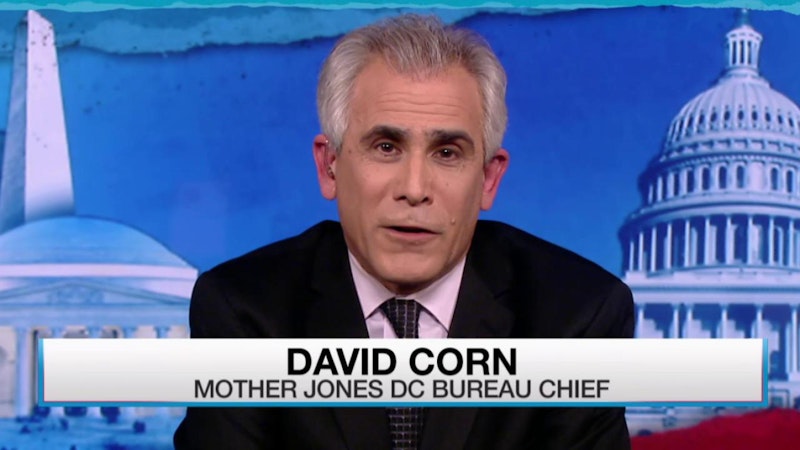On August 6, Mother Jones’ David Corn, responding to a statement by journalist Matt Taibbi, tweeted: “Matt is still spreading disinformation. The Steele dossier did not spur the FBI's Russia investigation. Who says so? John Durham & the bipartisan Senate intel committee chaired by Marco Rubio. Why fixate on the Steele memo and not the actual Russian attack waged to help Trump?”
Since when did Corn become concerned with spreading disinformation? It's understandable that fixating on the bogus Steele dossier bothers the journalist, as he's the one who broke that story on October 16, 2016 in Mother Jones. Now he's trying to gaslight us into believing that his story was no big deal, even though it was all over the news for months, just as he knew it would be. The compliant media took the phony dossier seriously, reporting on it as if it were a legitimate piece of intel. Corn has lately written on Twitter about how Tulsi Gabbard “cooked up a phony intelligence report to create a sham investigation.” That sounds a lot like what he did.
Corn, in his Steele dossier story, kept his source, former British spy Christopher Steele, anonymous. The dossier was a collection of memos that contained allegations of collusion—e.g. information exchanges between Russia and the Trump administration—as well lurid reports of Trump's personal behavior in Moscow. While Corn did not specifically refer to the “pee tapes,” he reported that the Russian government had compromising material on Trump that they could use to blackmail him. Many Americans had scary visions of Putin working Trump like a puppet.
After BuzzFeed later released the entire Steele dossier in its raw form and people learned about the “pee tapes,” late-night talk show host Stephen Colbert went to Russia to film a comedy bit on what he called a “bombshell” story. He rented the presidential suite at the Moscow Ritz-Carlton where the golden showers were alleged to have taken place, and said the bedroom was “soaked in history.” During a subsequent appearance on Conan O'Brien's show, Colbert said, “So I went over there and looked at it, and it's totally believable.” It's not clear what he saw in the room, besides a bed and some furniture, that made it so believable, but the FBI attributed the story to rumor or gossip.
Corn’s Mother Jones story stated that the Steele dossier was the product of an opposition research project financed by “a client allied with Democrats.” That client was Hillary Clinton's presidential campaign, which was looking for oppo research on Trump. Corn reported that former Trump bagman Michael Cohen travelled to Prague to discuss coordinating with Russian operatives during the 2016 presidential campaign. Cohen, who says he's never been to Prague, has provided passport records to support this claim. Regardless, the media reported on the story breathlessly.
The most fundamental principle of journalism, although rarely recognized today, is to seek the truth, but reporting unvetted information and gossip is in direct conflict with that principle. Igor Danchenko, a Washington-based researcher with expertise in Russian politics and business, provided about 80 percent of the dossier's raw intelligence, but later described much of it as unverified rumor and speculation.
Corn commented on the credibility of his anonymous source by using another anonymous source: “But a senior US government official not involved in this case but familiar with the former spy tells Mother Jones that he has been a credible source with a proven record of providing reliable, sensitive, and important information to the US government.” A more ethical reporter would’ve been upfront about disclosing the unreliability of raw intel. MSNBC, the Trump-obsessed cable channel Corn contributes to, covered the story as if the Steele dossier were a legitimate report. But Corn, writing, for Mother Jones a year later, admitted that the Steele memos had been “discredited.” His defense for reporting on them as if they were reliable was that they were “too important to voters” to withhold them.
It's ironic that, before breaking the Steele dossier story, Corn had already co-authored a 2006 book about the Iraq War—Hubris: The Inside Story Of Spin, Scandal, And The Selling Of The Iraq War—that points out the faulty and fraudulent intelligence George W. Bush's administration used to persuade the American public and Congress to support that disastrous, unnecessary war. Hubris detailed the role the media played, via their suspension of skepticism, in amplifying the non-existent threat that Iraq supposedly posed to the U.S.
That's the skepticism that Corn also abandoned in his Steele dossier story. After the Iraq WMD fiasco, he and the rest of the media should've been on alert for fake stories, but the opposite happened.
As a follow-up to breaking the Steele dossier, Corn published his 2018, anonymously-sourced book—Russian Roulette: The Inside Story of Putin’s War on America and the Election of Donald Trump—that drew heavily on the Steele dossier. He and co-author Michael Isikoff continued their quest to show the many ways that Vladimir Putin worked, with the implicit approval of Trump, to influence the 2016 presidential election. There were also suggestions of collusion, although the authors admitted they couldn't prove it. They were promoting an election denial narrative. The message was that Russia helped Trump in so many ways that the election wasn’t legitimate. Hillary Clinton was explicit about this. In a 2019 interview with CBS News, she said of Trump, “He knows he's an illegitimate president.” When Democrats call Trump an election denier, they should keep this in mind.
Russian Roulette presents the shadowy Steele in a positive light—e.g. “Surely, Steele believed, that was more than a coincidence,” and “On such matters, Steele was the man to see.” But the Steele dossier was circulated in major newsrooms before Corn broke his story. Other news outlets didn't report on the story because it wasn't properly sourced. Corn had no such concern. He let his source burn him like the partisan hack he is.

